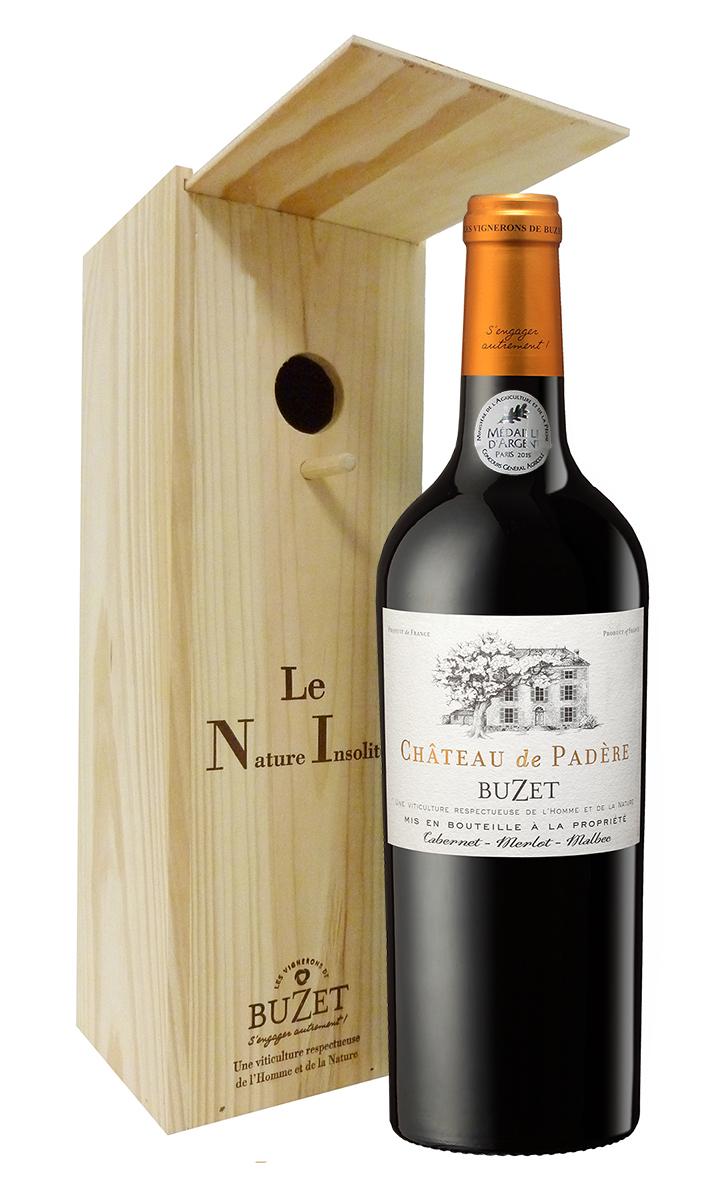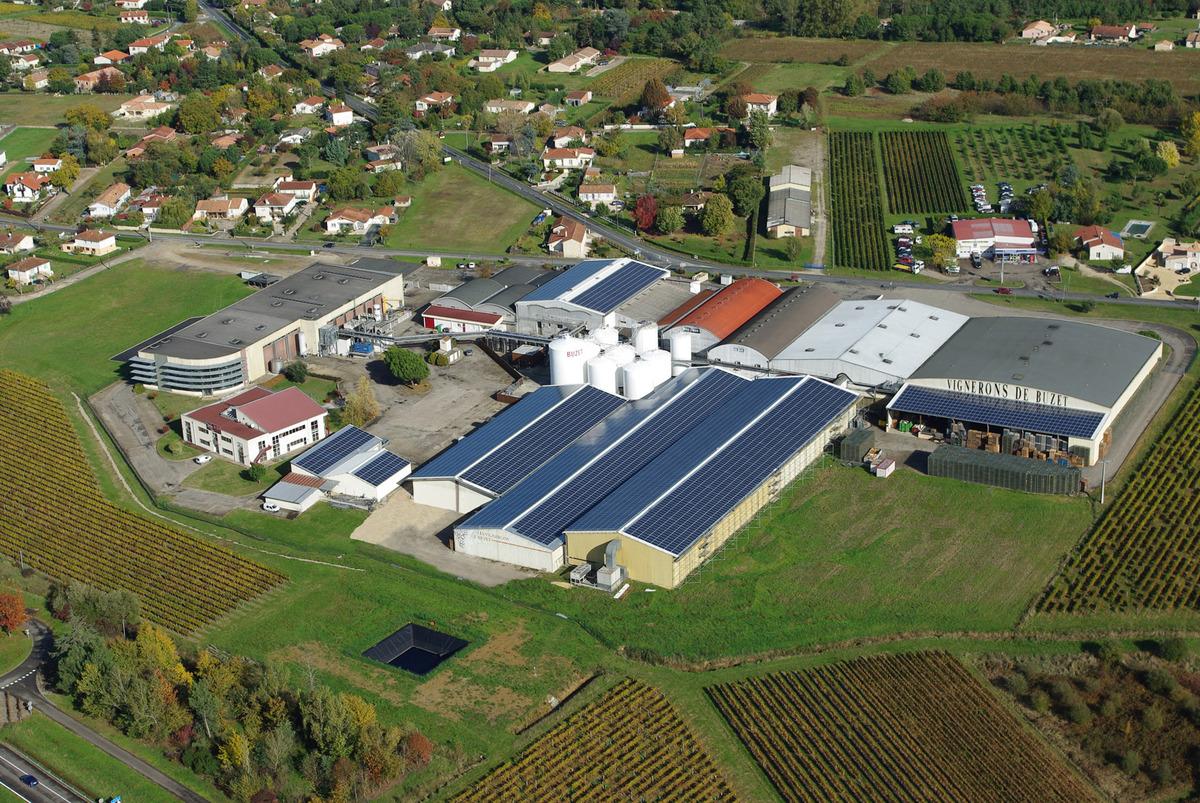"A different way to commit": common sense in our bottles
Project details
- Main leader : Vignerons de Buzet
- Type of initiative : Individual initiative (company, etc.)
- Périmètre : Production : Zone AOC BUZET / Commercialisation : France et international
- Localisation : Buzet sur baise
- Date de début : octobre 2005
Economy circular topics
- Extending useful service life
- Recycling
- Eco-design
- Sustainable procurement
- Responsible consumption
- Functional service economy
- Industrial and regional ecology
For over 10 years, the Cave des Vignerons (wine cellar) in Buzet has been committed to a form of wine-growing that reconciles the best technology, respect for people and the environment. It works with employees and winemakers in the field and helps to promote biodiversity.
In 2013 the cellar embarked on the complex task of performing a life cycle assessment on one of its references: Baron d'Albret red in a wooden case. The impacts of different aspects of grape growing, wine-making, manufacturing glass bottles and cases, transportation and recycling were all measured from the standpoint of climate change, biodiversity, water consumed and water pollution.
It turned out that two stages have a significant impact:
- the agricultural stage on biodiversity, eutrophication of marine waters and aquatic ecotoxicity;
- the production of packaging on climate change and water consumed.
The inventory confirmed that the cellar had already worked to reduce the environmental impact of the content - the wine - by means of its agricultural* and wine-making practices, by totally eliminating chemical fertilizers and some substances used for treatment.
It also brought to light a significant environmental benefit in recycling glass bottles.
To go further, the cellar and its suppliers have started thinking how they can improve packaging to reduce the impact of this stage. 34 companies, some of the most important suppliers of corks, bottles, wooden cases, boxes and labels, came along for a day dedicated to finding solutions to reduce environmental impacts, on December 3, 2013. The cellar and its partners together gave thought to possible optimizations and brought about some concrete improvements.
* The environmental practices implemented in the vineyard are not detailed in this article, but can be found in the sustainability reports at the cellar.
Dry materials: eco-design, responsible purchasing, reusing, recycling
A zero-carbon plant-based stopper made from a sugar cane polymer
During the seminar on eco-design, Nomacorc, the cellar’s leading provider of synthetic stoppers, wanted to join with the Buzet winemakers and contribute this innovation. This stopper is manufactured from plant polymers derived from sugar cane. Three years of research were required to develop this "select Bio" label from a 100% renewable raw material, whose carbon-footprint is zero by the end of production. Sugar cane plants are grown in a socially responsible manner, with no impact on either food supply or on deforestation. Sugar cane is then transformed into "select Bio” on our supplier’s Belgian production site in Liège. This site is a closed circuit, using 100% renewable energy. The manufacturing process requires only 0.02 litres of water per stopper.
Cases designed to be reusable
Why throw away the wooden case containing the bottles? The cellar has designed and produced several boxes to give a second lease of life to this wooden case. Some of these boxes can be transformed into nest boxes for the garden planters for the balcony, serving trays, tapas slates and cutting boards. More and more consumers, inspired by this, are sending in pictures showing what they have done with Vignerons de Buzet cases converted into bike luggage racks or custom-made shelves!
And also :
- Lightweight bottles (that can be transported in greater numbers)
- Digitally printed labels
- 100% recycled and recyclable boxes
- Larger containers. Three-litre bag-in-boxes are equivalent to four 75cl glass bottles saved for the same amount of wine. It is here that reduced pollution and impact may be the greatest.
A supply chain was created in 2014 to give total control of incoming and outgoing flows using monitoring indicators.
A responsible purchasing initiative was set up with ADEME and Coop de France Aquitaine, which was featured in a second supplier seminar in 2016. These suppliers were trained on the cellar’s responsible purchasing software during the day and were made aware of the supply chain initiative.
Eco-design for less water- and energy-greedy processes
Water management
To reduce the high consumption of water required by electrodialysis, the cellar has coupled it up to a reverse osmosis unit. This tool makes it possible to recycle 90% of the water used. In addition to this investment, ongoing work to heighten awareness is conducted with every employee of the cellar. As a result of these efforts, 1.80 litres of water are today sufficient to produce 1 litre of wine, or half as much as seven years ago.
The water system was completely redone in 2016 to minimize leakage.
In 2017 the wine cooperative will house an eco-treatment plant that will be part of a "water garden". This "wetland" will clean wastewater by the natural action of plants. This project is also more economical than conventional methods of treatment. It will enrich biodiversity by means of special facilities, and as it is open to visitors, it will be a place where people can have an informative stroll round. This is a further step towards an autonomous site.
Effective energy management
Several years ago, the cellar carried out work to reduce energy consumption:
- Photovoltaic panels,
- Autonomous outdoor lighting with solar energy,
- Light bulbs replaced with LEDs in conditioning buildings
- More energy efficient and less wasteful wine-making and stabilization techniques such as stabilization by electrodialysis instead of cold, and tangential filtration.
- Staff awareness
- Heat recovery from cleaning water on a bottling line
- Electric differential counting for detailed monitoring of consumption
In 2016, the cellar joined the collective initiative by Coop de France Aquitaine, Cap Energ'IAA, and structured its approach in the short, medium and long term in an energy management system compliant with ISO 50001. This involves looking at energy differently. For example, by becoming aware of the importance and multiplicity of external factors such as the volume of the harvest, climatic variations during the harvest while the temperature of the must and vats must be controlled. These factors will influence increasing or decreasing energy consumption over the year.
Qualitative benefits
On the economic front
- Supply chain: financial and organizational gain
- Reduced operating expenses
- Market differentiation
On the environmental front
- Lower impact on natural resources
- Lower consumption of energy and grey energy
On the social front
- Internal momentum
- No more filtration sediment residues: for better employee health
- LEDs: improved visual comfort for employees
- Dissemination of practices to suppliers
Stages of the initiative
- 2009: The cellar’s first carbon assessment
- 2012: "S’engager autrement” (a different way to commit): this visual identity suits actions to words
- 2013: 1st life cycle assessment of a product
- 2013: Supplier seminar on the theme of eco-design
- 2014: Supply chain created
- 2015: Winners of the first “Aquitain Eco-Conception” (Aquitaine Eco-Design) award for the innovation of the Oniric vintage
- 2016: 2nd supplier seminar on the theme of sustainable procurement - “Usine Alimentaire Durable” (sustainable food factory) award 2016
Driving factors: the deployment of sustainable development for all the company's services and the associated positive results are a source of great pride for employees and help to speed up the process.
Obstacles:
- Considerable investments
- Customer expectations which are not always in line with environmental developments. We must help customers to change.
- The cellar is one of the few big economic players in the Val d'Albret area, which limits the possibilities of initiatives such as industrial ecology, synergies, and pooling of flow exchanges.
Areas of activity
- Agriculture
- Food
Resources
- Water
- Food
- Wood
- Renewable energies
- Material efficiency
- Energy efficiency
- Glass
- Cardboard
- Unavoidable and recovered energy
- Photovoltaic energy
Technical resources
Reverse osmosis unit
76 hectares of vineyards dedicated to experimentation and 1 experimental wine storehouse
Eco-purification plant
Human resources
- Governance (Managing Director, CEO, Chairman of the Supervisory Board) leading the cellar’s CSR initiative
- A supply chain manager
- A Quality Manager
- The 95 employees of the cellar and 188 member winemakers working for this initiative
Financers
- Ademe
- Conseil Régional Nouvelle-Aquitaine

